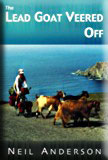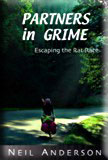|
Hermann the German In the morning Sherry said, "I'm really stiff." "The third day is always the worse," I told her. We had a good hearty breakfast-porridge. It stuck to our ribs and helped power us over the hills. At least that was Reinhard's theory. He assured us it would fuel us all the way to Rothenburg. And he was almost right-we made it as far as Caldozhofen, a small village about fifteen kilometers outside Rothenburg, before Sharon bonked. If we hadn't taken a grueling route Reinhard may have been spot on with his prediction. Riding through Eichmuhle there was an intersection with a stop sign. The stop sign was for us. Sharon and Sherry obliviously rode straight through. I informed them that a red octagon with stop on it meant the same thing in Germany as in Canada. They hadn't even noticed it! We followed the lightly traveled Romantic Strasse. Near Eganhausen there was a sharp seventeen percent uphill. Sherry pushed her bike again while complaining of a sore knee. She had been lagging behind but I just thought she didn't want to overstrain herself. A few kilometers farther Sharon bonked. She was out of reserve energy and became shaky and cranky. I guess we hadn't eaten all that much for breakfast as we didn't want to eat poor Reinhard out of house and home. We stopped in the quiet village of Caldozhofen. Remarkably, across the dirt road from a duck pond, there was a picnic table under a tree. We availed ourselves to the unexpected luxury and made the most of it by having a hot lunch. Sharon wished we had some bananas. She barely got the wish out when a large traveling grocery truck pulled up beside the duck pond and madly began blowing its horn. Two old farmwives appeared from side doors and made their way over expertly sashaying around cow pies. The grocery truck was well stocked with everything from canned goods to fresh fruit. We pedaled away very satisfied. In the early afternoon we arrived in historic Rothenburg ob der Tauber. In 1631, during the Thirty Years War, the town was conquered. The mayor figured he may as well welcome the conquering commander, so he filled the town's humongous three-liter tankard with wine, and presented it as a peace gesture. When the commander saw the size of the tankard, he was immediately struck by the humour, and dared the mayor to down the entire mug in one swill. If the mayor succeeded, the commander promised, he would allow Rothenburg to go free. The mayor took up the challenge, swigged the entire contents, and saved the town. (That's what I like about those old-time conquerors-they were usually true to their word.) In 1945, during the war, Rothenburg had been forty percent destroyed, then restored into one of the most intriguing walled towns in Germany. There was a walkway on the wall that allowed modern day scouts (tourists) a bird'seye view of town, surrounding countryside and Tauber River. Many Japanese tour groups wandered around. Rothenburg was not the usual sleepy little German town we often cruised through. We spent the afternoon sightseeing: the gate tower; the town hall; the flower gardens. The most enjoyable feature was just wandering the narrow cobble streets admiring the Bavarian timbered houses with their colorful flower boxes spilling over with blooms. Sherry had been to Rothenburg with Murray. She was our tour guide and took us to the most interesting sites. After seeing the town square, we went to her favorite shop-a Christmas store with every conceivable bauble imaginable. We wandered down to the opposite end of town. Through a stone archway there was a low rock wall surrounding gardens, complete with bike paths. Looking over the rock wall into the valley below, we tried to spot camping possibilities. Since Rothenburg was such a popular place there were no host families. We wanted to explore more of Rothenburg, so the only problem with going down into the river valley to camp would mean a stiff climb in the morning. Sharon said she had seen a clump of trees on our way into town. We headed back through the garden, riding our bikes along the path. Two policemen walked towards us. One called out, "No bicycle riding in the garden!" The Germans took their rules seriously. I should have called out "Bonjour!" Maybe they would have thought we were FrenchCanadians that didn't understand English. We hightailed it out of town and found a road heading into a farmer's field. We couldn't see any trees, so we pulled out our map to check for any green spaces nearby. A station wagon approached from the opposite direction. Looking us over, he pulled to a stop and rolled down his window.. "Gross Gott," I said, greeting him in the traditional Bavarian manner. It translated to Greet God, but was an idiom meaning: If you die and go to heaven say hi to God for me. Those Bavarian's had a sense of humor. "Where are you going?" he asked, in perfect English. "We aren't quite sure," I answered. "What are you looking for?" he persisted. "A spot to camp," I said. "I own all this land around here," he said. "My dad is a farmer in Canada," Sharon told him. That brought about a discussion of the size of farms in Canada, finally leading to alfalfa yields. The man spoke English well, but had difficulties when it came time to say alfalfa. "Alfla alfafalfa. That word just goes to shit in my mouth!" He pointed across the road and said there was a spot by the little shed where we could camp. "Come over to my farm later for some milk," he invited. "It's just back down that road with the cows painted on the fence," he directed, pulling away. "If you get lost, just ask for Hermann the German." We found a level spot next to the old building and set up. Sharon and Sherry checked out apple, pear and plum trees in the yard. They scrounged some of each-except for the pears-they were beyond their reach. Our supper was supplemented with our fruit windfall. By the time we finished, the night was black. We walked over to Hermann's dairy, expecting it to be on the edge of Rothenburg, but were surprised to find his dairy barns surrounded by apartment buildings and residential housing. We later learned that Hermann's farm was originally a hunting lodge in the woods surrounding the old walled village of Rothenburg. Hermann's family had purchased the lodge after the second world war. Since the German's were forbidden to own weapons, there wasn't much use for a hunting lodge, and converted it to a farm. The original farm was located within the village walls, but was destroyed and burnt when Rothenburg was bombed at the end of the war. The town grew and engulfed his farm. It was quite common to find farms coexisting with other residences. Sherry assured me she could detect a nearby village by the smell of manure in the air. She didn't enjoy the frequent rural odors that wafted past our noses as we rode. Hermann gave us a guided tour of the barns. Everything was spotless. The only superfluous items in the milk house were posters extolling the virtues of drinking milk. (Hermann gave us each a postagesized business card. On one side was his address, on the other it read: "If you drank more milk, I could afford a larger business card.") In one corner, a large stainless steel storage bin had pipes radiating from it. The pipes went to chained cows hooked to a milking machine. The cows' heads were over a feed trough and their back ends were over a metal grate. "They never go outside in their entire life," Hermann said. "They're born here and they die here." It seemed a horrid existence. Hermann took us into his machinery shed housing his large tractors and other farm equipment. On one wall Hermann proudly pointed out his license plate collection. He had plates from most of the States and some provinces. Each of the plates had a unique story behind it on how he had acquired it. Sherry promised she would send him one from Alberta when she got home. As Hermann had promised, our tour concluded by being invited into his home for milk and cookies. Inside the front door was his model tractor collection lined up perfectly behind glass. There was also a shelf with beer steins he had received from going in ten kilometer walks. Sherry decided she would enter just to get the beer stein. Hermann seated us in the living room and brought us a pitcher of ice cold milk and a platter filled with cookies. The cookies tasted oddly reminiscent of Sharon's mom's Christmas spiced fruit cookies. When Sharon queried Hermann he informed us they were indeed a Christmas specialty. Sharon knew her cookies. Hermann poured our half liter glasses to the brim with chillingly delicious milk. I tried to put those poor cows chained in the shed out of my mind. |
|
|


